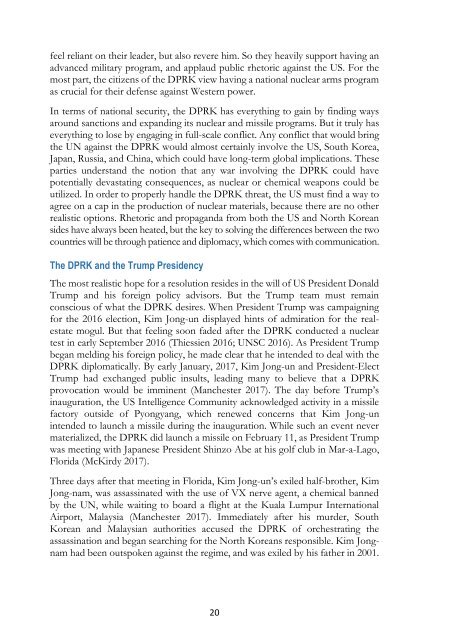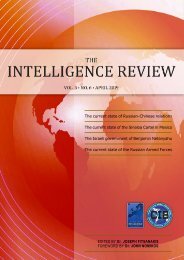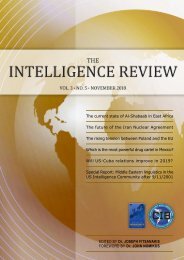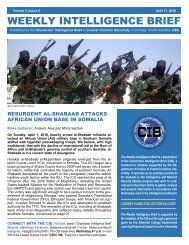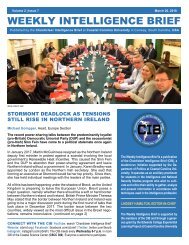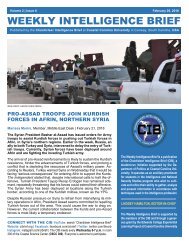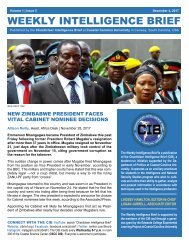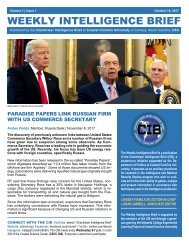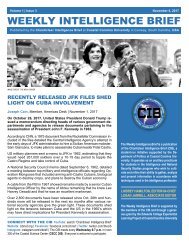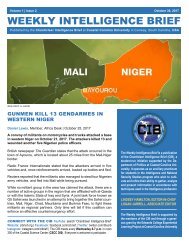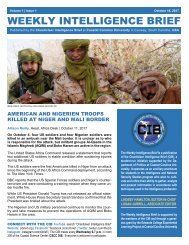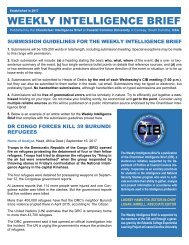The Intelligence Review | volume 2 | issue 4 |
This volume is the product of a collaboration between the European Intelligence Academy (EIA) and the Chanticleer Intelligence Brief (CIB), a student-run initiative supported by the Department of Politics at Coastal Carolina University in Conway, South Carolina, United States. Four CIB analysts tackle some of the most pressing and timely questions confronting intelligence observers today. Topics in this volume include the possibility of a war with North Korea, and the rise of far-right militancy in the United States. The volume also includes an assessment of the impact of the Islamic State in the relations between Russia and the United States, and a discussion of Turkish politics and its effect on NATO's cohesion.
This volume is the product of a collaboration between the European Intelligence Academy (EIA) and the Chanticleer Intelligence Brief (CIB), a student-run initiative supported by the Department of Politics at Coastal Carolina University in Conway, South Carolina, United States. Four CIB analysts tackle some of the most pressing and timely questions confronting intelligence observers today. Topics in this volume include the possibility of a war with North Korea, and the rise of far-right militancy in the United States. The volume also includes an assessment of the impact of the Islamic State in the relations between Russia and the United States, and a discussion of Turkish politics and its effect on NATO's cohesion.
Create successful ePaper yourself
Turn your PDF publications into a flip-book with our unique Google optimized e-Paper software.
feel reliant on their leader, but also revere him. So they heavily support having an<br />
advanced military program, and applaud public rhetoric against the US. For the<br />
most part, the citizens of the DPRK view having a national nuclear arms program<br />
as crucial for their defense against Western power.<br />
In terms of national security, the DPRK has everything to gain by finding ways<br />
around sanctions and expanding its nuclear and missile programs. But it truly has<br />
everything to lose by engaging in full-scale conflict. Any conflict that would bring<br />
the UN against the DPRK would almost certainly involve the US, South Korea,<br />
Japan, Russia, and China, which could have long-term global implications. <strong>The</strong>se<br />
parties understand the notion that any war involving the DPRK could have<br />
potentially devastating consequences, as nuclear or chemical weapons could be<br />
utilized. In order to properly handle the DPRK threat, the US must find a way to<br />
agree on a cap in the production of nuclear materials, because there are no other<br />
realistic options. Rhetoric and propaganda from both the US and North Korean<br />
sides have always been heated, but the key to solving the differences between the two<br />
countries will be through patience and diplomacy, which comes with communication.<br />
<strong>The</strong> DPRK and the Trump Presidency<br />
<strong>The</strong> most realistic hope for a resolution resides in the will of US President Donald<br />
Trump and his foreign policy advisors. But the Trump team must remain<br />
conscious of what the DPRK desires. When President Trump was campaigning<br />
for the 2016 election, Kim Jong-un displayed hints of admiration for the realestate<br />
mogul. But that feeling soon faded after the DPRK conducted a nuclear<br />
test in early September 2016 (Thiessien 2016; UNSC 2016). As President Trump<br />
began melding his foreign policy, he made clear that he intended to deal with the<br />
DPRK diplomatically. By early January, 2017, Kim Jong-un and President-Elect<br />
Trump had exchanged public insults, leading many to believe that a DPRK<br />
provocation would be imminent (Manchester 2017). <strong>The</strong> day before Trump’s<br />
inauguration, the US <strong>Intelligence</strong> Community acknowledged activity in a missile<br />
factory outside of Pyongyang, which renewed concerns that Kim Jong-un<br />
intended to launch a missile during the inauguration. While such an event never<br />
materialized, the DPRK did launch a missile on February 11, as President Trump<br />
was meeting with Japanese President Shinzo Abe at his golf club in Mar-a-Lago,<br />
Florida (McKirdy 2017).<br />
Three days after that meeting in Florida, Kim Jong-un’s exiled half-brother, Kim<br />
Jong-nam, was assassinated with the use of VX nerve agent, a chemical banned<br />
by the UN, while waiting to board a flight at the Kuala Lumpur International<br />
Airport, Malaysia (Manchester 2017). Immediately after his murder, South<br />
Korean and Malaysian authorities accused the DPRK of orchestrating the<br />
assassination and began searching for the North Koreans responsible. Kim Jongnam<br />
had been outspoken against the regime, and was exiled by his father in 2001.<br />
20


